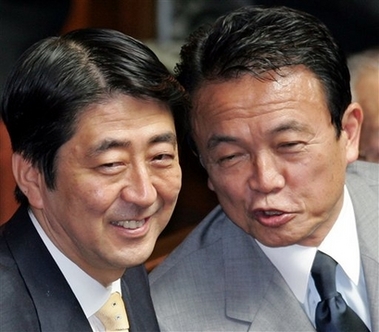Asia-Pacific
Abe maps out Japanese foreign policy
(AP)
Updated: 2006-09-29 18:14
 |
Large Medium Small |
TOKYO - Japan's new nationalist prime minister pledged Friday to make his country a decisive force on the international stage and push for a reduction of tensions with China and South Korea.
In his first speech before parliament since winning the premiership in a landslide vote Tuesday, Shinzo Abe also vowed to move ahead with revising the pacifist constitution and exploring a collective defense system with the United States.
|
|
Abe has struck a chord with the public by campaigning on a populist, nationalist agenda: He wants a more confident Japan that can distance itself from post-World War II guilt by amending the constitution and giving the military a bigger international profile.
"I believe it's entirely possible to create a country brimming with attractiveness and vigor, while maintaining the noble virtues of the Japanese people," he said. "I aim for a country that is trusted, revered and loved by the world and asserts its leadership."
Abe's Liberal Democratic Party has long campaigned to replace the pacifist constitution drafted by U.S. forces after World War II to revise phrasing that renounces the country's right to offensive action and bans maintaining a military for warfare.
He also vowed to push for better relations with China and South Korea. Tokyo announced on Thursday that Abe and South Korea's president have agreed to meet soon, and his aides are trying to arrange a similar meeting with China's leader.
"China and South Korea are important neighbors," Abe said. "Strengthening relationships of trust with the two countries is vital to Asia and to international society, and I believe it is important to communicate candidly and in a forward-looking way."
But he reiterated his hardline stance against North Korea, refusing to establish diplomatic ties with it until its past abductions of Japanese citizens are resolved.
Abe also promised to strengthen patriotism training in classrooms.
"The objective of education is to foster an ambitious people, and to build a dignified state and society," Abe said. "I will immediately engage in a revival of education to create citizens who treasure their families, their regions, their country, and life itself."
He promised measures to boost the country's competitiveness to support its resurgent economy, while vowing to cut down on government expenses.
Abe, who has taken a 30 percent pay cut to demonstrate his commitment to trimming the budget, promised fresh government job cuts and reform of the state's sprawling policy finance institutions.
He also outlined plans to overhaul the country's pension system — including dismantling the scandal-ridden Social Insurance Agency — in an attempt to deflect criticism that his focus on security and foreign policy were taking attention away from pressing domestic issues.
Abe has been condemned by critics who say his financial policies are too vague. He also has been accused of sidestepping the need for tax hikes to pay for the mounting medical and retirement costs of an aging population.
Still, the new leader was buoyed by the release Friday of healthy industrial production and consumer price figures that underlined the continued recovery of the world's second-largest economy. Japanese industrial production rose 1.9 percent in August from the previous month, while the core consumer price index rose 0.3 percent in August.
Though critics say the new prime minister lacks the charisma of his predecessor, Junichiro Koizumi, Abe had public approval ratings of up to 71 percent in his first round of newspaper polls published Thursday.
